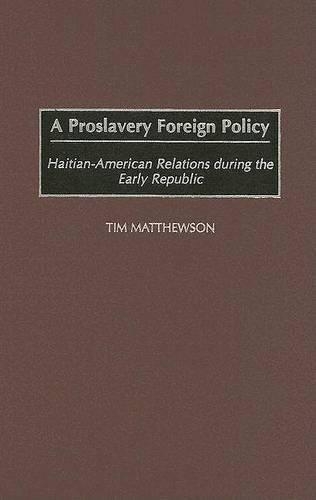
A Proslavery Foreign Policy: Haitian-American Relations during the Early Republic
Publishing Details
A Proslavery Foreign Policy: Haitian-American Relations during the Early Republic
By (Author) Tim Matthewson
Bloomsbury Publishing PLC
Praeger Publishers Inc
30th September 2003
United States
Classifications
Tertiary Education
Non Fiction
326.09730903
Physical Properties
176
Width 156mm, Height 235mm
397g
Description
While the influence of racial policy has long been a factor in American foreign policy, one particularly evident example is U.S. relations with Haiti. The troubled relationship began under George Washington, who authorized the dispatch of arms and ammunition to help the French planters of Saint Dominique, present day Haiti, suppress the black rebellion. Washington's support for the defense of slavery in this regard, proved to be important precedent in the formulation of a proslavery policy in the White House, the State Department, and the Congress. Matthewson explores this stormy legacy and discusses the tension between racial and economic imperatives that would continue to plague relations with the island nation for decades to come. The policies of Adams, Jefferson, and Monroe would follow lines similar to Washington's, particularly America's nonrecognition of Haiti, which would last until the Lincoln administration. The Monroe Doctrine of 1823 would include a racial exception to the ban on European expansion in the Americas. America even refused to attend the first Pan American Congress of 1826, because Haiti was on the agenda.
Reviews
The last decade has seen a welcome expansion of scholarship on the impact of the Haitian Revolution in the Atlantic world. Tim Matthewson's book makes an important contribution to this literature by providing a careful analysis of how political leaders in the United States responded to and sought to shape the course of Caribbean revolution. Organized chronologically through chapters on the Washington, Adams, and Jefferson administrations, the work effectively analyses the strands of thinking that generated varying and at times sharply contradictory policies. * American Historical Review *
In recent years, important studies on the history of Saint Domingue and the Republic of Haiti have rectified, to a great extent, our previous ignorance about many issues related to this always-conflictive Caribbean territory. Tim Matthewson's book constitutes a new effort to shed light upon the foreign policies developed by the first American administrations toward Saint Domingue and Haiti.Haiti is the forgotten member of our continental family. Any book, article, paper, documentary, or film that addresses its history and reality is a priceless contribution, not only to academics, but to the body of knowledge of a nation that has endured two hundred years of isolation from the rest of the world. This is a book for everybody with an interest in the history of the second independent republic of the Western Hemisphere. Hopefully in the near future someone will translate this volume into French and copies will be sent to each public and school library in Haiti. * Hispanic American Historical Review *
Tim Matthewson skillfully examines the evolution of official Untied States policy toward the rebelling colony of Saint Domingue and, later, the independent state of Haiti. . . . [T]he book challenges the worn-out and hopelessly dated hsitorical narrative of foreign relations during this period. . . . [M]attewson has put together an interesting and informed analysis of the evolution of proslavery diplomacy as the cornerstone of foreign policy in the early republic. * The Journal of Southern History *
[T]his book is a useful addition to the question of the influence of the Hatiian revolution on American history. * The Journal of American History *
Author Bio
Tim Matthewson is an independent researcher and president of the Patent Company, a patent research and services company. He received his PhD from the University of California, Santa Barbara, in 1976 where he studied under Alexander DeConde. Formerly with the National Endowment for the Humanities and the Papers of Albert Gallatin, he has taught at the University of California, Santa Barbara, the University of Wisconsin-Superior, and other universities.
